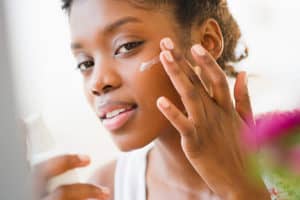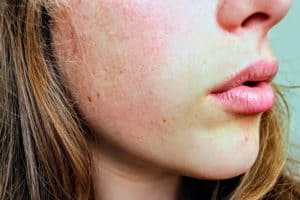Have you experienced that burning feeling when washing your face with soap? You’re not alone. It’s happened to me and many I know.
If your face burns after washing with soap, follow these 7 tips:
- Avoid Letting the Soap Sit on Your Face for Too Long
- Rinse the Soap Off Your face with Warm Water
- Use a Good Moisturizer After Washing
- Reduce How Often You Use the Soap
- Choose the Right Soap for Your Skin Type
- Choose a Different Type of Soap
- See a Dermatologist If Necessary
Read on to learn why soap burns your face and what to do if your face is burning. At the end of the post, I’ll give my personal experience of using African black soap and how it burned my skin.
Also, for an excellent cleansing wash, take a look at our top pick, the Theraderm Cleansing Wash: Oil-Free, Soap Free:
Click here to see it on Amazon.
Face Burns After Washing with Soap? 7 Skin Care Tips
1. Avoid Letting the Soap Sit on Your Face for Too Long
One of the biggest reasons I’ve come across why people get “soap burn” is that they leave the soap on their face for too long. Avoid letting the soap sit on your face for longer than 20-30 seconds.
Apply the soap gently to your face and then after about 20 seconds, rinse it off. You can even count to 20 to ensure it isn’t on too long.
Some soaps will have ingredients that could scratch your skin. This is the case for black soap, which has plantain and carob ash, and although beneficial for your skin, if left on your skin for too long, it can irritate it.
2. Rinse the Soap Off Your Face with Warm Water
If you rinse the soap off your face with very hot water, this can shock your skin cells and cause irritation. It is best to use tepid, lukewarm water when rinsing your face.
I also recommend rinsing twice. Rinse once to remove the soap residue, and then rinse a second time to ensure all soap is gone.
Also, don’t use very cold water to rinse as this could also irritate it. Use a water temperature that is lukewarm so that it is similar to our own body temperature.
When you wash your face in the morning and night, ensure to rinse the soap off your face, so it doesn’t sit there and burn your skin. First, gently splash lukewarm water on your face, apply the soap, then wash your face with water to rinse off the soap.
3. Use a Good Moisturizer After Washing
After washing your face, it is important to follow up with a good moisturizer. Soaps, face wash, and cleansers cannot help but strip some natural oils from your skin. A good moisturizer will replenish your skin with essential oils and also lock them in, keeping your skin hydrated.
I recommend moisturizers with humectants as they are very effective at attracting and locking in moisturizers to your skin. Also, great ingredients for moisturizers include glycerin, hyaluronic acid, and alpha-hydroxy acids.
4. Reduce How Often You Use the Soap
It’s important to use soap or face wash to keep your skin clean. It removes makeup, grime, dirt, toxins, and other impurities. However, you shouldn’t clean too often as this can irritate and cause your face to burn. If your face burns after washing with soap, simply reduce how often you use the soap.
This may seem obvious but must be mentioned in case you haven’t tried this. I had a friend who used soap every morning and night, and it was causing her issues.
I advised her to try just using it in the evening, and after trying this, her face had time to relax and therefore not be irritated. Constant over-washing can certainly cause irritation.
The other tips in this post, such as changing the soap you use, maybe a better solution, but it is worth mentioning that you should also not use the soap too much.
5. Choose the Right Soap for Your Skin Type
It’s easy to pick a soap based on the advertising in the store or what a friend told you, or what you hear on a commercial. The problem is that the models that put on that soap, or maybe even your friend, may have stronger, less sensitive skin than you.
Everyone’s skin is different. For example, a soap that is for oily skin will strip away the oils from someone with dry skin or sensitive skin. Or a soap that is for dry skin or sensitive skin may have too many added oils for someone with an oily skin type.
So, first, determine what is your skin type, and then choose a soap or face wash that is best for you.
I and many I know have combination skin with the T-zone area of the face being more oily with pores, and the rest of the face is drier. Your skin may be different, however. See the post I wrote about the 29 best cleansers for oily skin and large pores to find a cleanser or face wash that may work for you.
My new favorite cleanser is the Kanebo Sensai Silky Purifying Creamy Soap which has a Tri-Enzyme technology to cleanse, smooth, refine, and gently exfoliate your skin.
Click here to see it on Amazon.
My husband raves about the Theraderm Oil-Free Cleansing Wash, which is gentle enough but still removes all oil and grease. It leaves the skin looking and feeling amazing.
Click here to see it on Amazon.
There are many to choose from, but after testing and finding what is best for your skin, you can rest easy knowing you have found what works, and you don’t have to keep hunting for a good soap.
If you are trying to decide between a soap or face wash, it is best to try both. A face wash or cleanser was a formula that is often more gentle for sensitive skin.
Face soaps can be too harsh and irritating. I recommend trying both to see what works best for you. Start by applying a small amount on a small part of your skin and see if you experience any negative side effects.
Face wash and soap can both burn your sensitive skin if you choose the wrong one for your skin type. There are many ingredients in face washes and cleansers that could irritate or burn your skin, so it is best to carefully read the label and try several different products.
6. Choose a Different Type of Soap
Face soaps come in a wide array of options, including:
- Bars
- Soap-free
- Cleansing balms
- Oil-based
- Foams
- Non-Foaming
- Medicated
- Micellar
Many bar soaps are harsh and should be used with caution, if at all. I wrote my story below about my experience using African black soap. Black soap usually comes as a bar (or block), but it melts very easily as it has many natural oils and butters in it.
I made the mistake of leaving the black soap on my sensitive skin for too long each time I would wash my face in the morning. This caused my face to burn and sting. I solved this by simply counting to 10 or 20 seconds and then washing it off with warm water.
If you’re using bar soap and reducing the time it is on your face doesn’t work for you, you can switch to using the soap in liquid form. I have seen African black soap in gel or liquid form, for example.
Or look for any of the other many different types of soaps. Most soaps only need water to be activated and used properly. Micellar soaps are already watery by nature and only need a cotton pad to be applied to the skin.
7. See a Dermatologist If Necessary
It can be overwhelming trying to figure out why your face burns after washing with soap. If your skin gets too painful or gets extremely dry, peels, cracked, or maybe even bleeds, then you should go see a dermatologist.
Most of the tips in this post can be followed without having to visit a dermatologist, as you will solve the issue yourself.
Most of the time, it just takes trial and error when trying different soaps to see what feels best for your skin. But a dermatologist can prescribe a special program or prescription medication if all else fails. They can also help diagnose more serious skin issues like psoriasis, rosacea, or eczema.
A dermatologist will determine if you have sensitive skin and will be able to recommend a specific face wash or soap for you. Sensitive skin is not something to ignore as you can become irritated easily with the wrong face wash.
So I recommend seeing a dermatologist just to be on the safe side. They will diagnose the best face wash or soap for your specific skin type.
Why Does African Black Soap Burn My Face? My Personal Black Soap Experience
About six to eight months ago, I was eager to find a product that would help me remove all the dirt off my face and clear my acne. It resulted in me turning to African black soap.
I first want to describe how African black soap is made in order for you to understand how naturally potent it is. African black soap is made with the ash of plants native to West Africa, inviting cocoa pod and plantain skin and leaves.
It also commonly includes coconut butter, shea butter, coconut oil, and palm oil. I have a separate post on the black soap ingredients for you to learn exactly what is in it.
The first thing I would say, which is super important to know, is that African black soap is very strong. It’s important to test if you have sensitive skin or non-sensitive skin prior to using the product.
A good way to do that is to try it out on your neck or somewhere, which would have a similar skin texture to your face to be positive. Don’t just slather the black soap or similar face wash all over your skin, as this can greatly irritate sensitive skin.
There is also the possibility to have it be like a life changer and literally clear all your acne and all your problems and leave you with glowing skin.
African black soap has many benefits but just make sure to test out the product to really see where it falls for you and never forget that you actually do have the potential of hurting your face with that product.
This soap or face wash can make your skin raw if you leave it on for too long. I’ve heard people refer to their skin being “raw,” but I never actually knew what that meant until I tried it for myself.
I put the soap on my face and left it on for about 5 minutes before rinsing it off. It made my skin raw which means it made it dry and peel.
It has its benefits and downsides, but I definitely believe that it has more upsides than downsides. It can leave the skin very dry, and sometimes it can be dry to the point of cracking or like paper.
It really depends on the individual, and it’s important to test it on a small part of your skin before using it. Another thing to note is that if left on your skin for too long, it leaves your skin very tight as if someone was pulling it.
I suggest you test the soap and use it sparingly. When I say that, I mean either use it as a spot treatment or as a light scrub. It’s not the type of soap where you need to be deep cleansing your face for 30 minutes, scrubbing all your natural oils off. That is not what this product is meant to do.
If you do happen to have it react well with your skin, you can, of course, use the soap more heavily, but I still would caution against using it too intensely.
Just be careful of the amount of soap you use and the number of times you actually use it. I don’t believe that it’s an everyday product just because it is so harsh on the face.
I suggest starting with using it once or twice a week, then increasing to more frequent only if your skin didn’t get irritated. You can complement it with a softer type of face wash and moisturizer, which can help your skin rejuvenate or just help your skin to stay in a healthy form.
I actually do want you to go out there and try African black soap because it really could be your solution to acne, but at the same time, it really could be your worst enemy. Try it to see how you like it and if you guys actually do like it.
Conclusion
If your face burns after washing with soap or face wash, you may not need to throw your soap away. First, try to simply rinse the soap off your face sooner. Don’t leave it on for too long, longer than about 10-20 seconds if necessary.
Follow our 7 skin care tips or avoiding any burning sensation when you wash your face with soap:
- Avoid Letting the Soap Sit on Your Face for Too Long
- Rinse the Soap Off Your face with Warm Water
- Use a Good Moisturizer After Washing
- Reduce How Often You Use the Soap
- Choose the Right Soap for Your Skin Type
- Choose a Different Type of Soap
- See a Dermatologist If Necessary
Rinse the soap off with warm water, not very hot or very cold water.
Reduce how often you use the soap. For example, if you use it morning and night, just use it in the evening.
Use a good moisturizer after washing. See our post on our favorite moisturizer for all skin types to help you find the best one for your skin.
If rinsing it off your face sooner or using the soapless often and your face still burns, then pick a different soap. Different skin types have different needs, so choose the right soap for your skin type.
If you feel you have tried everything and nothing seems to be working, don’t hesitate to see a dermatologist for more insight into the issue.



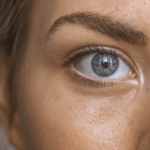
![Say Goodbye To Wrinkles On The Face [Easy Tips to Prevent Them] wrinkles on face](https://skincaregeeks.com/wp-content/uploads/2023/04/wrinkles-on-face-1-2-150x150.png)

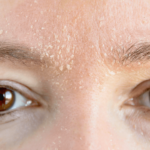

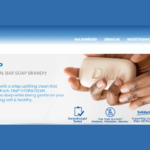
![Read more about the article Skin Feels Prickly but No Rash [9 Causes and Treatments]](https://skincaregeeks.com/wp-content/uploads/2020/12/skin-feels-prickly-300x200.jpg)
